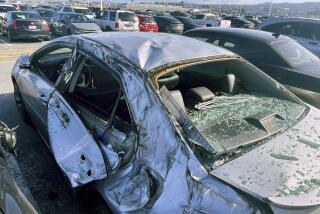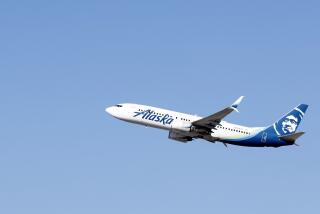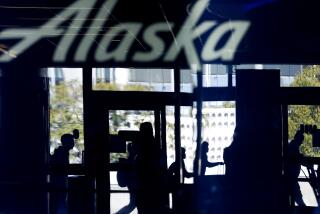Bin Laden’s death opens old wounds for airline workers
CHICAGO — Osama bin Laden’s death brought closure, but not celebration, to many airline workers.
Each time they secure a cockpit door, walk through security checkpoints or eye nervous passengers, many employees of United and American airlines are reminded of the Sept. 11 tragedy and the 35 friends and co-workers who died in hijacked jets.
News of Bin Laden’s death Sunday brought a jolt of memory of the sadness and shock they felt during the attacks. The terrorism strikes profoundly changed everyday life in aviation.
The attacks were a deeply personal blow for those who worked at the largest U.S. carriers, said current and former employees of Chicago-based United and Dallas-based American.
Andrew Studdert, United’s operations chief at the time, said the sense of violation was all the greater for him because United aircraft were used to inflict pain and violence on thousands of people.
“I didn’t feel joyous or happy,” said Studdert, of his response to learning Bin Laden had died. “I felt like, finally, this guy can’t hurt us again.”
Air travel dropped precipitously in the months following 9/11, but rebounded as risk and uncertainty became the new normal. Carriers soldiered on through wars, the SARS outbreak, volcanic eruptions, earthquakes, oil shocks and financial crises that caused the global airline industry to accumulate $50 billion in losses during the last decade.
But the attacks and their terrible human cost have not diminished for many in aviation. The largest pilots union and the Air Transport Association, a trade group, offered a $2-million reward for Bin Laden on top of the $25-million bounty that the FBI established for the terrorism leader’s capture or death. The two powerful industry players set up the reward for capturing airline terrorists in the aftermath of the Pan American World Airways bombing over Lockerbie, Scotland, said ATA spokesman Steve Lott.
“While we are collectively aware of today’s news, our company continues to remain focused on moving forward from that terrible day,” said American Airlines spokesman Tim Smith, “while continuing to remember, think of and pray for those who lost their lives, as well as for their loved ones who remain behind.”
A United spokeswoman declined comment.
The joy and the glamour of air travel also were casualties of 9/11 and the financial crisis that followed it, eventually plunging United, US Airways, Delta and Northwest airlines into bankruptcy. Airline workers faced depressing, daily reminders of that tragedy.
Passengers and employees faced more invasive screening as the Transportation Security Administration took over airport security. Pilots were armed and barricaded behind reinforced doors that turned simple acts such as visiting a lavatory into a chore. Glass and silverware were stripped from first-class meal service.
“Overnight, this was a whole different airline,” said Abby Alconcher, an American flight attendant and union official. “The airline industry changed in that moment. Even if the catering was different, it reminded you this is why it happened.”
Alconcher had been good friends with Betty Ong, a flight attendant killed on American Flight 11, and she lost another close friend in the Pentagon attack. She suffered post-traumatic stress and couldn’t work for about a month after the terrorism attacks.
“A lot of us couldn’t fly for a long time,” she said. “A lot of us went right back to work and just didn’t trust anybody.”
United pilot Herb Hunter had known one pilot and two flight attendants killed on Sept. 11, and he could visualize the events all the more clearly since he had piloted the Boeing models that were hijacked.
“It was devastating, and it made you feel all empty,” he said of learning of his colleagues’ deaths at the time. But his military training kicked in when United resumed flying.
“You got back in the seat because that’s what you do,” said Hunter, who is also a spokesman for the Air Line Pilots Association.
Security concerns are again making headlines as terrorism organizations threaten to retaliate for Bin Laden’s death. Multinational corporations are assessing travel risks for employees as well as for expatriates stationed near potential hot spots, said Kevin Mitchell, chairman of the Business Travel Coalition.
After the events of 9/11 and turbulence of the last decade, most people are taking the latest threats in stride, said Studdert, chief executive of NES Rentals Inc., a national heavy-equipment rental company.
“I think we’re all very well prepared, and so is our country,” Studdert said. “Bad things happen, and you move on. What’s the choice?”






